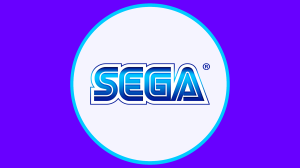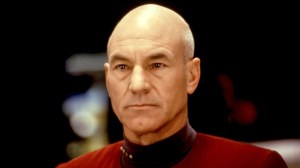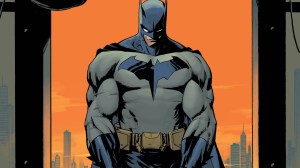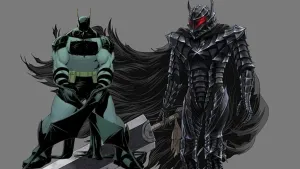Today marks the official start of the new Marvel NOW! initiative from Marvel Comics as Champions #1 and other Marvel NOW! titles hit store shelves.
Videos by ComicBook.com
In advance of the launch, Marvel executive editor Tom Brevoort took the time to talk to ComicBook.com about what Marvel has in store for readers following Civil War II. In the first part of our interview, Brevoort discusses Champions and Avengers. IN this, the second part of our interview, Brevoort takes a wider view of the Avengers line as of Marvel Now! And focuses in on Hawkeye’s new Avengers team appearing in Occupy Avengers.
Be sure to check out exclusive preview pages from Occupy Avengers #1 in the gallery below, and check back on Friday for the final part of our interview with Tom Brevoort, where we talk Ultimates2, Uncanny Avengers, and more!
While Champions and Avengers may be the flagships, they’re certainly a lot more going one with the Avengers family going into Marvel NOW! In broad strokes, what is the state of things for the Avengers following Civil War II?
TB: In the broadest strokes there is a lot of chaos coming out of Civil War II. Over on Uncanny Avengers, in the last of the actual Civil War II tie-ins, Captain America disbanded the Unity Squad after Rogue and Cable and Deadpool went off on an unauthorized mission that led them to contending with a US government CDC facility as they were trying to get materials and research and such into the ongoing Terrigen Mist poisoning mutantkind is dealing with.
On top of that, Captain America has his own situations going on, so maybe there is a little more to him disbanding that group than just those actions. Those group of characters are going to remain together in an ad hoc sort of way going into the next arc coming out of Civil War II, which immediately is about the Hand stealing the body of Bruce Banner with the intention of resurrecting it into one of their Hand puppets, which is something nobody in the Uncanny Avengers is particularly down with. They are going to have a huge fight with The Hand and with an enormous crazy zombie Hulk in a big way.
Then thereafter, the ongoing plot with the Red Skull that’s been building up steam in the background both in Uncanny Avengers and in the Captain America books is going to come to the fore as the Skull makes his move against these characters and things that were seeded in earlier issues. They are going to be pulled into that whole realm of things. They are very much at this point an unofficial outlaw sort of group, who are still caring the name Avengers because that’s who they are.
Elsewhere, coming out of Civil War II, the New Avengers will reach their finish. Again, without giving away too much about what happens at the end, there is a significant death.
There is a change of mandate and no longer will the New Avengers be operating on Avengers Island as Avengers Idea Mechanics. They will, in fact, be brought into the fold by the United States government and will effectively be American Innovation Mechanics and they will be a US-specific answer to a SHIELD or an Alpha Flight and be operating as the most overtly patriotic super team ever.
Whereas the core Avengers team has a relationship with the government, typically through SHIELD as a liaison, the US Avengers will be whole hog an all-American, flag-waving, Apple pie eating, terrorist smashing, supervillain trashing team. We will see that play out in the last few issues of New Avengers and then segue over into US Avengers #1.
A little further out, there are two more books. Occupy Avengers will pick up the story of Hawkeye coming out of Civil War II, having gone through those events, having made the decision to take Bruce Banner’s life when it appeared he might become the Hulk again. Having come through the trial that found him acquitted by the public and even popularized by the public as a sort of folk hero, as a normal person who did the thing that had to be done and stood up against this sort of one percent that is represented by the superhero community, who does what they want to do and sometimes acts out but is always forgiven for it.
Hawkeye has got a lot of his own personal demons that he is grappling. He is going to embark on a journey pretty much across the nation, trying to figure out what he is meant to be doing and going to be doing and trying to make something good out of the fact that now he is about the most popular superhero there is among the rank and file of the middle class of America. He will be putting together a group and a unit that’s out there trying to do good and trying to make a difference in things, and that will be the thrust of Occupy Avengers.
I haven’t said a heck of a lot yet about what other characters will be in the book, but there will be more characters in the book. It is a team book, but we take a few issues to get there. We will see this group build and accrue around Hawkeye and that, too, will be a more unofficial Avengers team in that there is no specific sanction from any government agency or SHIELD or anything like that.
In Detroit, the Great Lakes Avengers, through circumstance and through some luck, have wound up being recognized as an actual official adjunct of the Avengers. They are set up in an old Stark facility in Detroit and are going to be going about trying to establish themselves as a genuine, bonafide superhero team, in a city that’s itself in some strife and some disarray, and being not really any better about it than they had ever been in the past.
On a more cosmic level, coming out of Ultimates and into the new iteration, Ultimates2, the Ultimates team and the Ultimates characters will be delving into even bigger situations on a galactic cosmic multiversal level than they had been dealing with up to this point. It will still be more or less the same cast of characters. Galactus, as the lifebringer, will be a player in a major way in that title. We will be exploring all the mysteries that [writer Al Ewing] laid out in the first season involving what’s going on with Eternity and his chaining and what’s going on outside what exists in the current Marvel Universe and Marvel Multiverse. That’s all building to big, spectacular, mind-expanding and brain melting sorts of things down the road.
The only one I haven’t really touched on yet is Thunderbolts. Thunderbolts itself is on a fairly obvious collision course with events that are building up in the Captain America books, given that, beyond the main Thunderbolts cast itself, one of the key players in that book is a young Kobik, who was the character that made Steve Rogers the way he is and is a potential ticking time bomb at the center of that team.
Going into Civil War II and coming out of Civil War II, Bucky, as he attempts to save Steve from the prediction that Ulysses made at the end of Civil War #5, is apprehended and the question the Thunderbolts need to answer for themselves first is. “Do we want to do anything about that? Is that something smart for us to do? Should we just cut our losses and run? Should we go back to the thing we were doing before this? What’s our obligation here? What are we going to be?”
Even if and when that whole situation gets resolved, it’s only a matter of time, and not much time, before that book begins to crash in a significant way into Captain America: Steve Rogers and Captain America: Sam Wilson as that story builds to the big stuff that’s coming out of that. It’s on a slightly different track than the other Avengers books if only because it’s not being set up now and coming out of Civil War II. It’s already on its journey. It’s significant leading into the things we will be talking about soon.

It is interesting how many of these Avengers titles feature unofficial Avengers teams. That’s quite a departure from the large, singular force of Jonathan Hickman’s Avengers run, or even “The Heroic Age” era, where there were different teams but still a central command. What led to this splintering of the Avengers?
TB: Again, when we talked about pendulum swing, I think it has a little bit to do with that. Some of that ebb and flow is even how many Avengers titles we have at a given point. Moving into the All-New, All-Different period from what was going on before that, which was really Jonathan’s run and the books that were around Jonathan’s run, the launch of Uncanny Avengers and so forth, my feeling at that point was we had too many Avengers titles. In fact, I moved to pull it back and pull it down to a smaller number of books that were actually called Avengers. It’s one of the reasons that Ultimates is Ultimates and not, say, Ultimate Avengers because I just felt like there were too many Avengers titles at this point.
The concept begins to become sloshy. It’s not easy for a reader to understand what specific ground each group stands upon. We pulled that back and I think that worked out pretty well, at least in the short term. Now, coming out of Civil War II, we are at a point where we can expand and do some other different things again.
Again, like with the pendulum swing between classic characters and new characters, inevitably we will come to some point where we will begin to bang all these teams and characters together and maybe we will re-arranged and re-align them. Certainly, something is going to have to happen with the Uncanny Avengers and the Unity Squad before too long because they have IvX on the horizon, and they have the Skull on the horizon, and they are on those vectors. Their situation is definitely going to reach some changing point.
We were just at a point where it seemed a good time for me to relax and to do some books within the Avengers family that were not just the same thing. I think Occupy Avengers is going to be a very different flavor than people expect from a typical Avengers book and certainly, Great Lakes Avengers is going to be a very different flavor than what people think of on a typical Avengers book.
To me it always comes down to, “Can I define what each book is, at least in my own head, in such a way that it is offering something more than just more of the same?” Sometimes we succeed at that better than other times and that’s why every so often we take stock and we restack the deck and we shuffle the cards in a different way, to try to make that better and to try to keep things dynamic and in motion so there’s always change. There’s always status quo shifting. There’s always characters coming in and out. There’s always an effect and ramifications of the stories we are telling. We are just at that particular point now.
Do you think there are characters within the Marvel Universe who worry about the concept of the Avengers become too sloshy and ill-defined? Characters that worry that the Avengers name will become diluted if too many groups are allowed to stake a claim to it?
T: I think there certainly could be that. We have seen that on occasion in the past and perhaps we will in the future. It’s a little difficult to talk about that right now, just because the Avengers you would think of as having the strongest opinion of that, which is to say the founding Avengers, are more or less in sort of a strange place at this point in time.
We have not said much about where Tony Stark is and I’m not going to right now. Certainly, Steve Rogers has bigger fish to fry right at this moment than that question. In fact, that question may actually be helpful to his ultimate aims and agendas. Thor is not even Thor anymore. Hank Pym is dead. Janet van Dyne is running with the Uncanny Avengers at the moment but is not really in a place where she can re-establish herself as the keeper of the Avengers gateway. Bruce Banner is dead.
While there are characters who might have that concern, at the moment they are all dealing with very different things, but that certainly can change. I am never opposed to the idea of having two or three or four of these groups come into contact and even come into conflict. I think there are interesting things that can come out of that as well.
The title Occupy Avengers obviously triggers an association with a particular social movement. What was the thought process and the decision-making process that landing on Occupy Avengers as the title for Hawkeye’s new book?
TB: It sort of happened almost accidentally, in a sense. At the last Marvel retreat, we were at we talked a lot about Hawkeye, where he was at in Civil War II, where he was going to be at coming out of it and a bunch of ideas were thrown around for what could happen after that. Quite honestly, I was having a hard time wrapping my head around it. In fact, for the longest while – and when I say the longest while, it was probably only a week or two – we were vacillating between, “Do we do a new Hawkeye book that’s Clint on this journey, or does this become the core of an Avengers book?”
For about two weeks I was thinking, “This is going to be a Hawkeye book. This is not an Avengers book. This is not a team book.” As so often happens, I was on my train ride, my commute, one morning and, at least in my own head, I cracked it. I figured out, “Ah, I got it. It’s this. This is how that book works and this is the characters we use and this is how we set it up,” and it became that.
Occupy Avengers was sort of a placeholder. Occupy Avengers was actually going to be, originally, the tagline, the promotional line for the book. It came up when we were talking about stuff at that retreat and, consequently, I don’t remember which of the writers or editors who were there actually came up with it. It might have even been me, but it probably wasn’t. We started to look at, “Okay, what’s the actual title of the book?” None of the titles we were casting around with communicated the underlying concept of the series.
At a certain point in talking with David Gabriel, our head of sales, he suggested, “Why don’t we just call it Occupy Avengers? Let’s just make that the title and come up with another tagline.” We sort of backed into the name Occupy Avengers.
The book does have a reflection on the state of the world today. While it’s not an endorsement of any particular political or sociopolitical mindset, it is reflective. It is going to be dealing with probably more ground-level, real-world concerns than the average Avengers book does. The Occupy label on it is reflective of the kinds of stories that are going to be done there. We did not initially plan it that way. It’s where the journey led us.

There’s a fair bit of sociopolitical commentary and context in these new Marvel NOW! Titles. Occupy Avengers has it right there in the title, and Champions #1 doesn’t shy away from it. What do you think it is that is leading these writers to that well at this moment?
TB: I think at this particular moment, obviously, we are at a point in history where there is a lot of tumult. There is a lot of conflicts and a lot of questions about where should we be going as a nation and as a people. It all tends to center right now around the presidential election, but it’s a little larger than that with all these various shootings and the riots and protests and things. Every day there is something else going on. We are just at a moment in history where there is a lot of churn in terms of this stuff.
Writers naturally tend to click into that sort of thing and want to explore some of these ideas in the stories they tell. One of the things we talk about as a general approach to all of the Marvel characters and Marvel as a whole is it really should be reflective of the world we all live in, the audience and the creators ourselves.
Going back to the simplest version of this, where Stan [Lee] put the superheroes in Manhattan rather than Metropolis, the Marvel heroes are meant to live in the real world and if they live in the real world of right now, then in some metaphoric way they probably should be grappling with some of the same stuff that all of us as Americans and citizens of earth are grappling with right now. I think that as much as anything else is what’s driving some of the conversation within the pages of various titles that we are doing.
Gabriel Walta is the artist on Occupy Avengers. He’s one of the most interesting rising artists at Marvel right now, having come up from an acclaimed run on Magneto and another on The Vision. What appeals to you about Walta’s art, and what about his art makes him right for Occupy Avengers?
TB: I think certainly he had two real breakouts, with Magneto and then with The Vision, that show what he’s capable of. He has a great sense of page design and storytelling. His characters are interesting. He is able to bring the emotion. He is also able to bring a certain level of intensity. But there is a realism, and it’s an abstracted realism, but there’s a realism to what Gabriel does.
Whether it’s the Visions living in their Washington DC-based little house on the street or whether it’s Magneto in some far-off country dealing with the ramifications of his actions in the past and hunting down the perpetrators of violence against mutants in the present, it’s plausible. It feels real. It’s visceral. I think Occupy Avengers will be able to take advantage of that viscerality in a very direct way.
One of the things that unites Magneto and The Vision, at least in my mind – nd it’s a strange thing to say because you don’t necessarily on the surface think about the Vision as a character this way – they are both very emotionally-charged books. They are both books that are as much about the internal lives of those characters as about them flying around and punching and hitting and battling stuff. Occupy Avengers is going to be very much of a piece with that. It’s going to be a very emotional book for Hawkeye and for the other characters that are on the journey with him and not just business as usual.
The fact Gabriel can tap into that sense and represent it visually on the page so that it’s not just an abstract concept that only lives in the words, and the captions, and the speech balloons, and so forth but that’s actually there and felt in the visualization of what’s transpiring I think is a huge plus.
Plus, I just think he is great and it’s a nice opportunity to put him on a book that maybe, because it’s launching and because it’s an Avengers title, will get a few more eyeballs on it and people will grow to know and love his work.
There was some fan outcry when the Nighthawk series, which was also written by Occupy Avengers writer David F. Walker, was canceled. Has Is Nighthawk a character whose name has come up when considering characters for Hawkeye’s Occupy Avengers team?
TB: That’s an obvious question and I will say yes, his name has come up.








